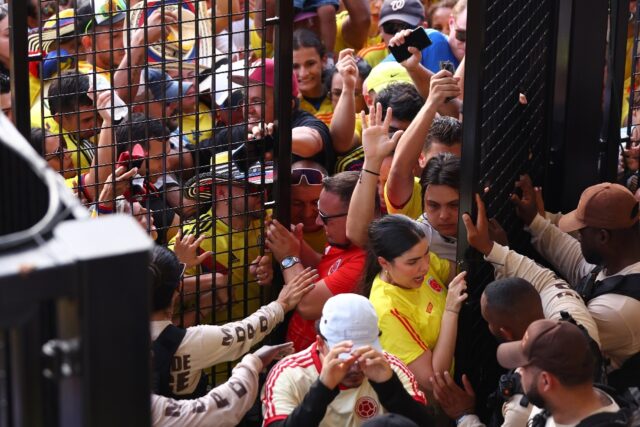The chaotic scenes at the Copa America final have raised serious questions for the organizers of the 2026 World Cup which will be held in North America.
The start of Sunday’s final between Colombia and Argentina at Miami’s Hard Rock Stadium was delayed by 82 minutes as overwhelmed security struggled to process the safe entry fans into the stadium.
Organisers blamed ticketless fans for rushing the entry points into the venue for their decision to keep the gates closed for almost three hours after the planned opening time.
But, while there was plenty of evidence of ticketless fans entering, it was also clear that the security system was unable to cope.
Some fans needed medical attention for heat exhaustion after being stuck in the crush around the fencing at the entrance to the 65,000 capacity venue amid alarming scenes.
Hard Rock Stadium will host seven games at the 2026 World Cup which the USA is co-hosting with Mexico and Canada.
The Copa America was organised by South American confederation CONMEBOL while the World Cup will be controlled by global governing body FIFA and it’s local organisation.
“This is not a good look,” said former USA international Alexi Lalas, now a leading television pundit for Fox Sports.
“I understand this is not a good look for CONMEBOL and this is also, because it is happening on our watch, in our country, not a good look for the US less than two years out from the World Cup,” he said.
FIFA, who had no role in the running of the Copa, did not immediately comment on the incidents but sources indicated they would now intensify discussions with stadiums over their security plans.
‘An embarrassment’
A former stadium employee, who spoke to AFP on the condition of anonymity, said that the incident at Hard Rock was down to bad organisation.
“I know this facility like the back of my hand, this should never happen,” he said after spending over two hours in the crush outside the ground.
“If you’re worried about weapons, if you’re worried about guns, if you’re worried about knives, you set up a perimeter, you check them and check tickets outside, not in a gate where you funnel in 10,000 people when you have women and children, you have women and children passing out at the gate trying to get into the stadium with people paying $2,000 a ticket,” he said.
“This is an embarrassment, for CONMEBOL, for the Hard Rock Stadium, an embarrassment that should never happen,” he added.
FIFA’s World Cup stadiums tend to use such a perimeter control, as the initial check on fans, before they enter a zone closer to the venue.
“I have no doubt that FIFA and the USA and Canada and Mexico will sort this out and make sure that this doesn’t happen going forward,” said Lalas during the match broadcast.
But the Miami debacle was not the only incident to raise concerns during the Copa America.
Wednesday’s semi-final between Colombia and Uruguay in Charlotte ended in ugly scenes as Uruguayan players climbed into the stands and clashed with Colombian fans, claiming family members had been threatened in the unsegregated stands.
As in Miami, local stadium security and police appeared to be caught by surprise by the very different behaviour of soccer fans compared to the far less rowdy NFL spectators they are used to.
All the World Cup stadiums for the 2026 World Cup are NFL venues. The USA hosted the World Cup in 1994 which was viewed as a successful tournament, setting a new attendance record.
The placing of grass surfaces over or in place of American football’s artificial turf fields caused plenty of issues during Copa America, with several coaches including Argentina’s Lionel Scaloni complaining about the poor quality.
FIFA sources said they intend to have all stadiums install grass in good time, rather than the very late switches that occurred for the Copa America.
But the bigger issue appears to be in training and preparing stadium security to deal with soccer crowds and having an effective system in place.
Canada’s American coach Jesse Marsch believes that the Copa’s issues were mainly due to CONMEBOL’s inexperience in the US market and that FIFA will do a better job in 2026.
“They made the mistake of thinking that they were just going to bring all their people from South America and be able to run a tournament in a new country and they were going to be able to do it seamlessly. And they made a massive mistake in that,” he told Canadian Press.
“(FIFA’s) overall experience for running tournaments, I think, is at a much different level,” he said.

COMMENTS
Please let us know if you're having issues with commenting.